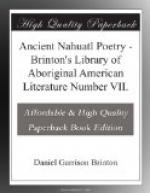5. O prudent Yoyontzin, famous king and peerless monarch, rejoice in the present, be happy in the springtime, for a day shall come in which thou shall vainly seek these joys.
6. Then thy destiny shall snatch the sceptre from thy hand, thy moon shall wane, no longer wilt thou be strong and proud, then thy servants shall be destitute of all things.
7. In this sad event, the nobles of thy line, the provinces of might, children of noble parents, lacking thee as their lord, shall taste the bitterness of poverty.
8. They shall call to mind how great was thy pomp, thy triumphs and victories, and bewailing the glory and majesty of the past, their tears will flow like seas.
9. These thy descendants who serve thy plume and crown, when thou art gone, will forsake Culhuacan, and as exiles will increase their woes.
10. Little will fame have to tell of this wondrous majesty, worthy of a thousand heralds; the nations will only remember how wisely governed the three chieftains who held the power,
11. At Mexico, Montezuma the famous and valorous, at Culhuacan the fortunate Nezahualcoyotl, and at the stronghold of Acatlapan, Totoquilhuatli.
12. I fear no oblivion for thy just deeds, standing as thou dost in thy place appointed by the Supreme Lord of All, who governs all things.
13. Therefore, O Nezahualcoyotl, rejoice in what the present offers, crown thyself with flowers from thy gardens, hear my song and music which aim to please thee.
14. The pleasures and riches of this life are but loaned, their substance is vain, their appearance illusory; and so true is this that I ask thee for an answer to these questions:
15. What has become of Cihuapan? Of the brave Quantzintecomatzin? Of Conahuatzin? What of all these people? Perhaps these very words have already passed into another life.
16. Would that we who are now united by the ties of love and friendship could foresee the sharp edge of death, for nothing is certain, and the future ever brings changes.
* * * * *
The third is a “spring song” in which the distinguished warriors of the king are compared to precious stones. Such jewels were believed by the Nahuas to possess certain mysterious powers as charms and amulets, a belief, it is needless to say, found among almost all nations. In verse 18 there is a reference to the superstition that at dawn, when these jewels are exposed to the first rays of the sun, they emit a fine vapor which wafts abroad their subtle potency. The poem is in Spanish verse, and the original is said to have been written down by Don Fernando de Avila, governor of Tlalmanalco, from the mouth of Don Juan de Aguilar, governor of Cultepec, a direct descendant of Nezahualcoyotl.
III.
1. The flowery spring has its house, its court, its palace, adorned with riches, with goods in abundance.




